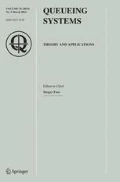Abstract
Consider a discrete time queue with i.i.d. arrivals (see the generalisation below) and a single server with a buffer length m. Let τm be the first time an overflow occurs. We obtain asymptotic rate of growth of moments and distributions of τm as m → ∞. We also show that under general conditions, the overflow epochs converge to a compound Poisson process. Furthermore, we show that the results for the overflow epochs are qualitatively as well as quantitatively different from the excursion process of an infinite buffer queue studied in continuous time in the literature. Asymptotic results for several other characteristics of the loss process are also studied, e.g., exponential decay of the probability of no loss (for a fixed buffer length) in time [0,η], η → ∞, total number of packets lost in [0, η, maximum run of loss states in [0, η]. We also study tails of stationary distributions. All results extend to the multiserver case and most to a Markov modulated arrival process.
Similar content being viewed by others
References
J. Abate, G.L. Choudhary and W. Whitt, Waiting time tail probabilities in queues with long tail service time distributions, Queueing Systems 16 (1994) 311–338.
J. Abate and W. Whitt, A heavy traffic expansion for the asymptotic decay rates of tail probabilities in multichannel queues, Oper. Res. Lett. 15 (1994) 223–230.
B.C. Arnold and J.A. Villasenov, The distribution of maximum time till departure from a state in a Markov chain, in: Statistics: Extremes and Applications, ed. J. Tiagode (Reidel, Dordrecht, The Netherlands, 1984).
S. Asmussen, Conditioned limit theorems relating a random walk to its associates, with applications to risk processes and the GI/G/1 queue, Adv. Appl. Probab. 14 (1982) 143–170.
S. Asmussen, Applied Probability and Queues (Wiley, Chichester, 1987).
S. Asmussen, Subexponential asymptotics for stochastic processes: extremal behaviour, stationary distributions, and first passage probabilities, Preprint, Lund Univ. (February 1996).
S. Asmussen and D. Perry, On cycle maxima, first passage problems and extreme value theory for queues, Stoch. Models 8 (1992) 421–458.
R.V. Benevento, The occurence of sequence pattern in ergodic Markov chains, Stochastic Process. Appl. 17(2) (1984) 369–373.
H. Bruneel, Performance of discrete time queueing systems, Comput. Oper. Res. 20(3) (1993) 303–320.
H. Bruneel and B.G. Kim, Discrete-Time Models for Communication Systems Including ATM (Kluwer Academic Publishers, Dordrecht, 1993).
I. Cidon, A. Khamisy and M. Sidi, On packet loss process in high-speed networks, in: Proc. INFOCOM 92 (1992) pp. 0242–0251.
J.W. Cohen, Some results on regular variation for distributions in queueing and fluctuation theory, J. Appl. Probab. 10 (1973) 343–353.
M. Czorgo, L. Havarth and J. Steinbach, Invariance principles for renewal processes, Ann. Probab. 15 (1987) 1441–1460.
A. Dembo and O. Zeitouni, Large Deviation Techniques and Applications (Jones and Bartlett, Boston, 1993).
F.M. Guillemin and R.R. Mazumdar, Excursions of the workload process in G/GI/1 queues, submitted (1995).
J.Y. Hui, Resource allocation for broadband networks, IEEE J. Select. Areas Comm., SAC 6 (1988) 1598–1608.
D.L. Iglehart, Extreme values in the GI/G/1 queue, Ann. Math. Statist. 43 (1972) 627–635.
J. Keilson, Markov Chain Models - Rarity and Exponentiality (Springer, New York, 1979).
K. Norbert, Longest runs in Markov chains, in: Probabilty and Statistical Inference, eds. W. Grossman et al. (Reidel, Dordrecht, The Netherlands, 1982).
A.G. Pakes, On the tails of waiting time distributions, J. Appl. Probab. 12 (1975) 555–564.
J.W. Roberts, COST Project 224 final report - performance evaluation and design of multiserver networks, Technical report, European Economic Community (October 1991).
H. Rootzen, Maxima and exceedances of stationary Markov chains, Adv. Appl. Probab. 20(2) (1988) 371–390.
J.S. Sadowsky, Large deviation theory and efficient simulation of excessive backlogs in a GI/GI/m queue, IEEE Trans. Automat. Control AC 36 (1991) 1383–1394.
V. Sharma, Invariance principles for regenerative and Markov processes with applications to queueing networks, Technical report, ISRO-IISc Space Technology Cell, Bangalore, India (May 1993).
V. Sharma, Markov modulated queues in discrete time - some limit theorems, Technical report, ISRO-IISc Space Technology Cell, Bangalore, India (April 1993).
V. Sharma, Analysis of discrete time queues with applications to ATM based B-ISDNs, Technical report, ISRO-IISc Space Technology Cell, Bangalore, India (April 1995).
V. Sharma, Reliable estimation via simulation, Queueing Systems 19 (1995) 169–192.
V. Sharma, Approximations of general discrete time queues with arrivals modulated by finite chains, to appear in Adv. Appl. Probab. (December 1997).
V. Sharma and N.D. Gangadhar, Some algorithms for discrete time queues with finite capacity, to appear in Queueing Systems (1997).
K. Sohraby, On the theory of general ON/OFF sources with applications in high-speed networks, in: Proc. INFOCOM 93 (1993) pp. 401–410.
F. Spitzer, Principles of Random Walk (Springer, New York, 1976).
T. Takine, T. Suda and T. Hasegawa, Cell loss and output process analysis of a finite buffer discretetime ATM queueing system with correlated arrivals, in: Proc. INFOCOM 93 (1993) pp. 1259–1269.
W. Whitt, Tail probabilities with statistical multiplexing and effective bandwidths in multi-class queues, Telecommunication Systems 2 (1993) 71–107.
K-D. Wirth, On stationary queues with batch arrivals, Electronische Informationsvefarbeitung und Kybernetik (Journal of Information Processsing and Cybernetics) 18(10/11) (1982) 603–619.
Author information
Authors and Affiliations
Rights and permissions
About this article
Cite this article
Sharma, V., Gangadhar, N.D. Asymptotics for transient and stationary probabilities for finite and infinite buffer discrete time queues. Queueing Systems 26, 1–22 (1997). https://doi.org/10.1023/A:1019164720680
Issue Date:
DOI: https://doi.org/10.1023/A:1019164720680



